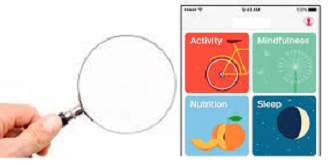Cell phone has become our best ally. We carry it with us almost everywhere, we use it at all times, we wake up and sleep with it and use it continuously to communicate with other people.
But have you ever gave a thought about what all information your mobile phone has about you?
We are not always aware of the amount of information we share with the device. And the fact is that inside the memory of the cell phone, we not only keep our contact book, but also the places we frequently visit, the music we listen to, E-mails and messages we receive, the time we wake up… and much more!
These are the increasingly popular ‘metadata’, the’data about data’ that explains details about our communications and reveals patterns of behavior and daily routines in a way that is not very obvious.
Here are some of the things that your smartphone “knows” about you and that you “told” about yourself, probably without even realizing it.
1. The speed at which you walk
Your cell phone’s location data tells a detailed story about you.
Most smartphones have GPS navigation enabled, which allows applications like Google Maps to answer questions about how to get from one place to another or where the nearest hospital is located.
It is certainly a useful application, especially for people whose sense of direction does not work very well.
However, geolocation services also let your device know how fast you’re moving from one place to another, whether you’re driving or walking…. and a few more things.
2. Where you live, where you work and what places you frequent
You don’t have to write down your home address on your cell phone map. Using the geolocation services on your phone leaves metadata that can be used to find out where you live.
And not only that, they also reveal your workplace, your most popular coffee shop or your health centre.
“Your location history is accessible to anyone who has or can access your phone,” explains Tactical Technology Collective, an international non-governmental organization for digital trace monitoring.
“Apple uses an algorithm or formula that assumes that the location where your phone usually is at night is your ‘home’. And if it stays somewhere else all day, it must be your workplace.
These traces are useful for companies and entities to know where you are.
Unless you’ve already turned off location services or frequent locations, your phone is probably registering your location on the device..
You want to check it out for yourself? Follow these steps on your mobile: “Settings” -> “Privacy” -> “Location services”. If you have an iPhone that works with iOS 7 or a newer version, you can even see the mapped locations by selecting “System Service Frequently Asked Locations”.
3. How much sport you play and how healthy you are
If you are one of those who have a sports application installed on your cell phone -whether it’s running or doing repetitions and exercise routines – maybe you should remember that every time you use it you are telling your cell phone what your level of physical activity is.
The same goes for your health status, which can be extracted from metadata extracted from such apps and from other apps that measure specific things related to the number of hours you sleep, your menstrual cycle or your heart rate.
“There’s probably more information about you on your phone than there is at home,” Apple CEO Tim Cook told ABC News in 2016.
“Our smartphones are filled with conversations, financial data, health records and much more. They are also burdened with the location of our children in many cases,” he added.
4. How many taxis do you take and how much do you tip
When you use applications like Uber and other private transport apps, you leave a record of how often you use these services on your mobile phone.
But metadata often comes from external sources.
In 2014, a database was released by the New York City Limousine and Taxi Commission that recorded every move made in 2013.
According to Neustar Research, this data contained information on the origin and destination of each trip, the location and the amount of the tip.
And that’s just one example.
5. What time you wake up and what time you go to sleep
Using the cell phone as an alarm clock is a very common custom in this day and age.
In addition, the phones are also capable of recording our sleep times and monitoring them. iOS 10, the penultimate software released by Apple, is able to detect through the alarm clock function the time you fall asleep, if you wake up during the night and when you wake up.
This data has been used to create sleep maps of the world and can be used for medical purposes.
However, they can be used for darker purposes, such as selling us advertising when we are awake at night, and we are more vulnerable to offers from some companies.
Ultimately, though, it’s up to you to decide how much information you share with your cell phone.



very meaningful post Aarti